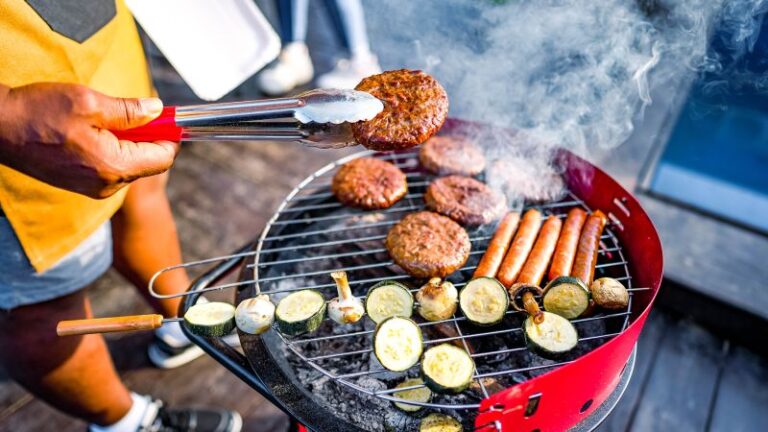Get inspired by our weekly roundup of tips for living simply and fulfillingly. Sign up for CNN’s Life, But Better newsletter for information and tools to improve your health.
CNN
—
This Independence Day holiday comes as a record-breaking heatwave sweeps across much of the United States and the world, bringing potentially deadly temperatures. Parts of the South and Southwest are at risk of record-breaking heat and extreme temperatures. California is expected to be especially hard hit, with many areas seeing highs exceeding 110 degrees Fahrenheit (43 degrees Celsius).
At the same time, bird flu outbreaks are spreading to cows, raising questions about whether certain foods such as milk, eggs and hamburgers are safe.
After drinking copious amounts of water at outdoor concerts and sweating in the heat and humidity this week, I thought about how to celebrate Independence Day safely. How about eating barbecued meat, burgers, and potato salad in the heat outside? How can you stay cool while having a picnic or barbecue this holiday weekend?
Given the expected high temperatures, are there any further precautions to take regarding food safety? Also, are there any health factors to consider during this holiday, like staying cool and drinking plenty of fluids?
To answer these questions, I spoke with CNN health expert Dr. Leana Wen, an emergency physician and clinical associate professor at George Washington University, who previously served as Baltimore’s health commissioner.
03:24 – Source: CNN
What happens to your body when the temperature rises?
CNN: Can you reiterate why food safety is important?
Dr. Leana Wen: According to the Centers for Disease Control and Prevention, there are approximately 9 million cases of foodborne illnesses each year in the United States. These illnesses occur primarily when people consume food or drink that is contaminated with bacteria, viruses, or parasites.
Most symptoms are mild, but even mild illness can be unpleasant. Common symptoms include nausea, vomiting, abdominal pain, and diarrhea. Some people may become seriously ill and require hospitalization, and unfortunately, may die. Those at highest risk of severe illness include the elderly, children under the age of five, pregnant women, and people with weakened immune systems.
CNN: What precautions should people take regarding food at barbecues and other outdoor gatherings?
Wen: Undercooked meat contains many infectious microorganisms, and the best way to tell if meat is cooked through is to use an internal thermometer.
To check the internal temperatures to cook different types of meat, we recommend this U.S. government food safety website. For example, chicken should be cooked to an internal temperature of at least 165°F, and ground beef should be cooked to at least 160°F.
Once meat is cooked, keep it at or above 140 degrees Fahrenheit until you are ready to eat it to prevent bacterial growth. Before cooking, refrigerate raw meat rather than leaving it at room temperature. Remove it just before putting it on the barbecue.
CNN: Temperatures are expected to be much warmer this week, but are there any other specific factors we should take into consideration?
Wen: Yes, the USDA advises that fresh produce can be stored unrefrigerated for up to two hours under normal weather conditions, but if temperatures exceed 90 degrees Fahrenheit, this time is reduced to one hour.
This also applies to cooked meats, like burgers, and perishable salads, like potato salad and coleslaw. In hot weather, these foods should be eaten immediately, but otherwise, they should be refrigerated within an hour.
CNN: What about people having barbecues in parks or other places where there’s no refrigeration?
Wen: Have a well-insulated cooler with plenty of ice on hand. Keep raw, uncooked meats below 40 degrees Fahrenheit until you’re ready to grill them.
It is also recommended that raw meats be stored in tightly sealed bags to avoid contaminating other foods that are served raw, such as vegetables and fruits.
Another thing to remember when barbecuing is to be mindful of the utensils and plates you use for raw meat and other foods. Label any utensils, plates or containers that come into contact with raw meat. Keep them separate from plates containing salads, fruit, chips, bread etc.
CNN: Do you always wash your hands after handling raw meat?
Wen: Yes, of course. Avoid preparing a salad immediately after handling raw hamburger meat, and always wash your hands thoroughly with soap and water after handling raw meat.
CNN: Let’s talk a little bit about bird flu. Has the bird flu outbreak affected your views on eating foods like burgers and chicken wings? Is it still safe to eat eggs or drink milk?
Wen: Federal health officials say it’s safe to continue eating meat and eggs as long as they’re cooked to recommended temperatures.
It is also safe to continue drinking milk, but it is important to emphasize that milk must be pasteurized. Raw milk is not safe to drink. Not only can raw milk harbor bacteria, but it can also transmit avian flu. Before the avian flu outbreak, drinking raw milk or consuming products made from raw milk was not recommended, and it is still not recommended now.
CNN: We’ve talked a lot about food safety. What other health issues should we consider this Fourth of July?
Wen: In hot weather, watch for the symptoms of heat exhaustion and heat stroke. Pay attention to those most susceptible to heat stroke, especially children, the elderly, and those with chronic illnesses. Watch out for pets, too; pets can get heat stroke. Never leave pets or children in a car, as the interior of a car can heat up quickly and high temperatures can be fatal.
Stay in the shade whenever possible. Drink plenty of fluids – water is the best way to stay hydrated, but too much caffeine and alcohol can be dangerous during a heatwave. Wear protective clothing and reapply sunscreen frequently.
Get inspired by our weekly roundup of tips for living simply and fulfillingly. Sign up for CNN’s Life, But Better newsletter for information and tools to improve your health.

